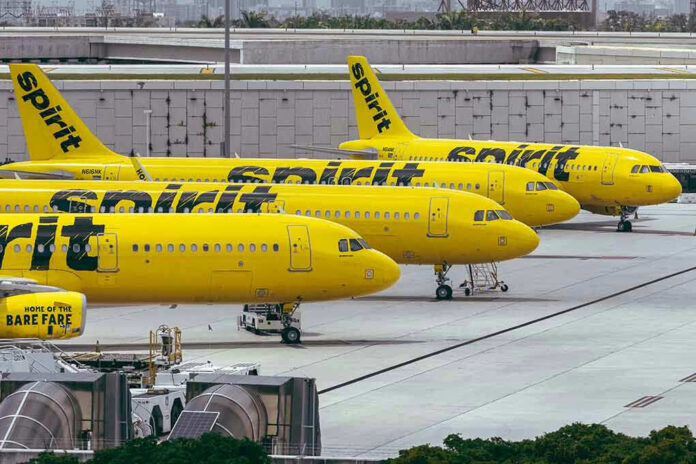
A near-miss between Spirit Airlines and Air Force One sparked national debate after air traffic controllers blasted the Spirit pilots with, “Pay attention! Get off the iPad,” raising alarm over cockpit distractions and security protocols during President Trump’s transatlantic flight.
Story Snapshot
- Spirit Airlines pilots criticized by air traffic control for slow response near Air Force One carrying President Trump.
- ATC audio’s “Get off the iPad” remark ignites concerns about cockpit distractions and pilot attentiveness.
- Incident highlights strict rules for VIP airspace separation and renewed scrutiny on aviation safety procedures.
- No safety breach occurred, but public debate centers on technology use and aviation standards.
VIP Airspace Protocols and Spirit Airlines’ Close Call
On the morning of September 16, 2025, Spirit Airlines flight 1300 was flying from Fort Lauderdale to Boston when it entered the same busy New York airspace as Air Force One, which was transporting President Trump and the First Lady to the United Kingdom. Air traffic controllers, tasked with safeguarding the president and maintaining order in one of the country’s densest flight corridors, issued multiple urgent commands for the Spirit pilots to change course by twenty degrees. After a noticeable delay, the pilots complied, prompting a frustrated controller to admonish, “Pay attention! Get off the iPad.” The exchange, captured in publicly released ATC audio, quickly drew nationwide attention as it underscored the high stakes and zero-tolerance environment surrounding presidential air travel.
The incident did not result in an actual safety breach, but the proximity between the two aircraft, especially involving Air Force One, triggered heightened scrutiny. Strict federal regulations require commercial pilots to immediately follow ATC instructions, particularly near flights carrying high-profile individuals. These protocols exist not only to protect the president but to ensure the integrity of American airspace. The public nature of the controller’s rebuke—unusual in its bluntness—has put a spotlight on the professionalism demanded of pilots and the challenges of managing complex airspace during VIP movements.
Cockpit Technology and Distraction Risks
The now-infamous “Get off the iPad” comment has fueled debate about the role of electronic devices in modern cockpits. Pilots rely increasingly on iPads and similar devices for navigation charts, checklists, and communications, but this reliance brings new risks of distraction. Experts note that while these tools are indispensable for flight operations, they can divert attention at critical moments if not managed properly. Aviation safety analysts argue that this incident illustrates the need for constant vigilance and clear communication, especially in high-stress or high-security situations. Some experts have offered possible explanations for the pilots’ delay, such as technical issues or procedural complications, but the essential concern remains: distractions, even from approved devices, can undermine the split-second decision-making required in aviation.
Stakeholders, Accountability, and Regulatory Response
Several key players are at the center of this incident: the Spirit Airlines pilots and crew, New York Center’s air traffic controllers, the Federal Aviation Administration (FAA), and the White House security team. Air traffic controllers hold operational authority in the skies, and pilots are legally and ethically obliged to comply with their instructions without delay. The FAA serves as the regulatory watchdog, empowered to investigate incidents and issue sanctions when necessary. Spirit Airlines quickly confirmed that their pilots followed procedures and landed safely, emphasizing their commitment to safety. As of reporting, neither the FAA nor the White House has issued a formal statement or announced an investigation, but the spread of ATC audio has already prompted industry-wide reflection. The balance between leveraging technology for efficiency and ensuring it does not compromise attentiveness or protocol adherence is now a central focus for airlines and regulators alike.
No injuries or violations were reported, but the involvement of Air Force One elevated this otherwise minor event into a significant point of discussion about aviation standards and the consequences of even momentary lapses in cockpit focus. The power dynamics are clear: controllers direct, pilots comply, and the FAA stands ready to enforce the rules. The incident could lead to further guidance on electronic device use and stricter enforcement of VIP airspace separation, reinforcing the foundational principle that national security and public safety must never be compromised by avoidable distractions.
Industry Perspectives and Public Reaction
Aviation analysts widely agree that, while actual danger was avoided, the Spirit Airlines incident is a timely reminder of the importance of rigorous training and discipline in the cockpit. Some professionals defend the pilots, citing possible technical or procedural reasons for the delayed response, such as a pilot temporarily away from controls. Others assert that the bluntness of the air traffic controller’s rebuke was justified given the VIP context and the need for unwavering attention. Academic researchers further highlight the dual-edged nature of cockpit technology: essential for modern flight but a potential source of distraction if not judiciously managed. The public release of the ATC audio has sparked a broader conversation about how airlines and regulators must adapt procedures to account for evolving cockpit technology while upholding the strictest safety and security standards.
Sources:
Spirit Airlines Plane Gets Too Close To Air Force One












